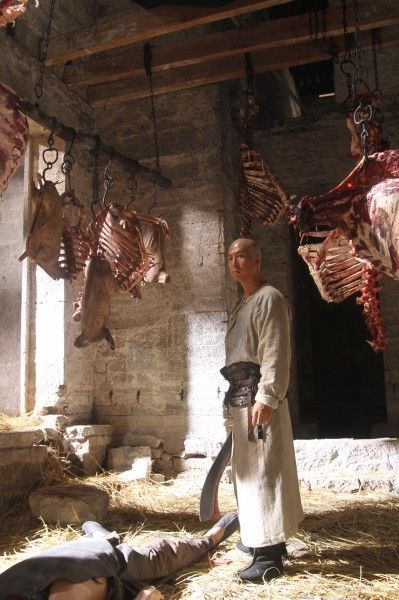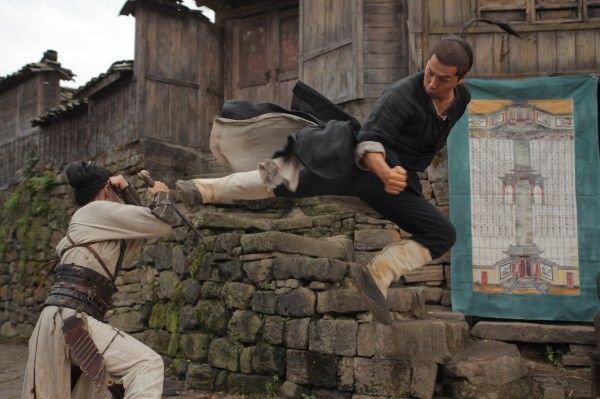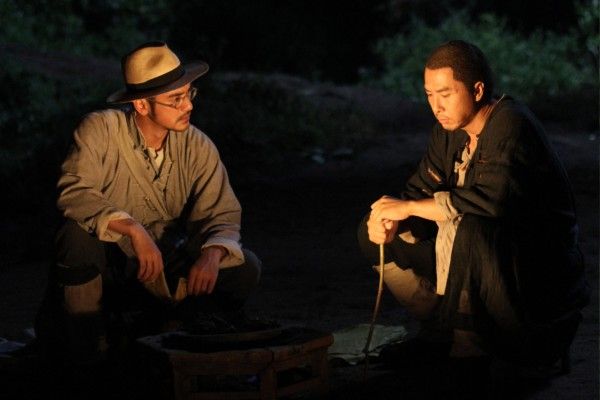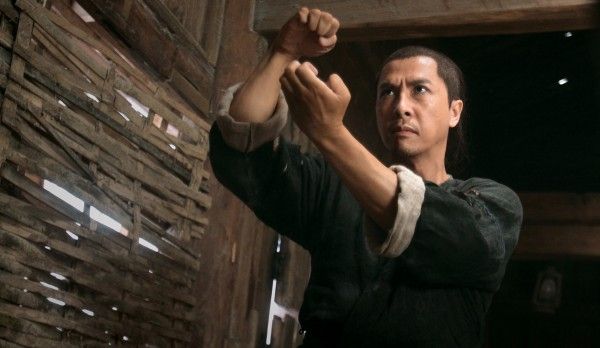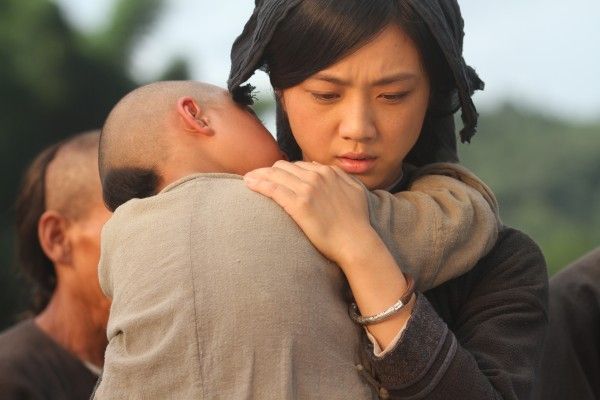While Donnie Yen made a name for himself on American shores with his breakout hit in 2008, Ip Man, his reputation was established for many martial arts action film fans long before he ever played the Wing Chun grandmaster. I spoke with the multi-talented Yen earlier this year in promotion of his upcoming film, Wu Xia (or Dragon). The period film, set in 1917 China, revolves around an investigation into his character, Liu Jinxi, and the mysterious death of two criminals that were attempting to rob a general store. Some have likened the film to David Cronenberg’s A History of Violence, and the careful balance between fighting for what is right even if it doesn’t benefit the greater good is touched on.
While the conversation strayed from touching on Dragon directly, I did get his thoughts on playing a character with a reserved nature, the differences between a period film and a modern film, and his preferences between the two. Additionally, we talked about how he feels he is a martial arts chameleon, his reason for turning down The Expendables 2, how much he trains between films, his love of MMA, and much more. You can find the complete interview after the jump.
Collider: You've made quite a few modern films, and you've made a lot of period films. Do you prefer working in one time period or another?
Donnie Yen: I actually prefer modern film, honestly. I feel in a modern film that I'm not restricted to a certain way of... For example, in a period film, where I'm playing a historical person, then a certain characteristic and restriction of that character. A period film, where you, for example, where you have a traditional wardrobes, you are bound to act a certain way. But in a modern film, a lot of body gesture. I mean, think about if you're playing in a period film... If you're playing a cop in a modern film, you don't have to walk with your spine straight up and bow before a fight. [Laughs]. There's a lot of free form of expressing yourself as an actor. That's what I like about playing in a modern film. And with the martial arts, I like to play with new things. That's what I did with SPL and Flash Point. SPL was the first time that I kind of injected some MMA elements in there and, of course, in Flash Point I explored and in my mainland film. In Chinese it's called Special Identity. We don't have an English title yet, but I fully explore that. I'm a big fan of the MMA fighting style.
Speaking about that, I was going to ask you if you stick with one specific martial art if it's a period film?
Yen: In a modern film, I wouldn't be posing as much, right? [Laughs]. You don't expect to jump off of buildings, as much. Everything has to be more logical and practical in a modern film. But in a period film, you can play with different things. I have a concept that the longer away from today, the more of an against the gravity body mechanics they employ. But there, more importantly, is the character. If I'm playing General Guan, while dissecting that character, those martial arts style automatically come into place. He fights in a war zone, he holds a big weapon, they take down horses, and he's in the army. So, you already know exactly what you're getting into. For Ip Man, he's very simple. He's a Wing Chun master. What is his character? He goes home at 7 o'clock at night. Listens to his wife. He's a very quiet gentleman. Passive. So, that style is automatically in play.
The Weistein Company picked this film up for U.S. distribution. Is breaking out in the U.S. a goal for you?
Yen: Not really. Once I wanted to see where I was going. I spent a couple of years doing American films. I did a few. My last film was Shanghai Knights. I'm still getting offers here and there. But I think that with the world getting so small, if you do good work, everyone's going to see it in the end. So there's no such thing as "this market" or "that market". It's one market. It's one world market, now. But, at the same time, I'm open for anything. If I find a role where I'm passionate about, I wouldn't mind trying it. But it has to be the right role.
Speaking on that, I know that you were briefly rumored to be in talks for The Expendables 2.
Yen: Yes, I was. I was offered to play one of the roles in The Expendables 2. It was very flattering to be able to act beside other great action icons, from Arnold [Schwarzenegger] to [Sylvester] Stallone, and just everyone. But I felt that because it's such a big, entourage lineup I felt it would limit my possibility of expressing my talent. So, that was the reason why I unfortunately turned down.
In several interviews you've expressed your love of MMA, and you mentioned it today. You've said you're a fan of UFC and things like that. You obviously have a diverse knowledge of different martial arts. Is fight choreography enough to keep you up to date and fresh or do you have to train outside of that as well?
Yen: I try to update my arsenal constantly. Learning different martial arts since childhood. To understand what's out there. To really be in tune. That's what I like about UFC. But the main reason I like UFC is not just the martial arts aspect, but it's about one person against the other person. It's about being able to test yourself with the truth. There's a life to it, right? Of course, I love the science behind it. From UFC's early fights to nowadays, and how they collaborate different core training to the traditional karate and Western boxing, or whatever. That was always my belief. I believe the very first person who came up with that philosophy was Bruce Lee. Bruce Lee just so happened to be my idol, so he inspired me in many ways. So it was great to see that the whole mixed martial arts, which Bruce Lee was trying to teach from his philosophy of martial arts, and then to turn into such a popular and common event today. That's primarily my reasons of being a fan.
Specifically, though, do you train a lot outside of the fight choreography?
Yen: Do I train a lot? Let's put it this way: If you think, like, I accelerate when it's time to accelerate. I reserve my energy. I do a lot of films throughout the year. Last two years, I did four movies one year and three movies in the other.
Wow.
Yen: If I'm training every day, then I'd burn out. A specific character requires specific martial arts style, so I've pretty much tackled that particular character when the time is expected. For example, when I did Ip Man, I started training in Wing Chun and understanding and dissecting it, and alongside was dissecting and researching the character itself. Like six months before I actually went in to shooting. Basically drop everything and get into that. When you're talking about getting into character as an actor, you also have to get into character as a martial artist. You have to think of yourself as a Wing Chun person rather than a judo person or whatever. You are playing that person with particular expertise in Wing Chun. If I was in a film like Flash Point, where it's more of a modern combat and practical combat oriented, which is fitted to that character. So, your body is in tune for that style. I guess I'm pretty lucky because in childhood I studied so many martial arts styles and I never stopped researching them, my body is very adjustable and I can turn into different expressions with my body. It sounds funny, huh? Sounds like a chameleon.
[Laughs]
Yen: It's similar to acting with martial arts. You kind of switch modes. It was very tough. When I did Ip Man, it was very tough because I was doing modern film and then all of a sudden I had to switch to, "OK, wait a minute, I have to walk like Ip Man." Raise my arms like in a fighting pose like Wing Chun. The palm is open. More of a defensive technique. You can't raise your arms above your shoulders. You can't move from side to side. You can't dance around. [Laughs]. Then after I did Ip Man, I went back to this movie called Special Identity, and you go to a whole contemporary fighting style and more of an MMA style. Then, all of a sudden, wait a minute, you're bobbing and weaving again. You're throwing wild hooks. You do an uppercut. You think now it's different. So I have to switch modes.
Speaking about this film, along with Ip Man and Ip Man 2, you play reserved characters where you have this inner beast within you. Do you enjoy that aspect of being able to play a character where you walk tall and don't have to flex your muscles all the time? Or do you enjoy more of a Legend of the Fist role where you're on it, all the time?
Yen: It's my job to play as accurate as possible for that character's characteristics. Playing Ip Man, as you mentioned, he's more of a scholarly, reserved, quiet person. So therefore, I have to portray that. It's just acting. So I don't really particularly enjoy one versus the other.
Dragon will be in limited theatrical release on November, 30, 2012.


